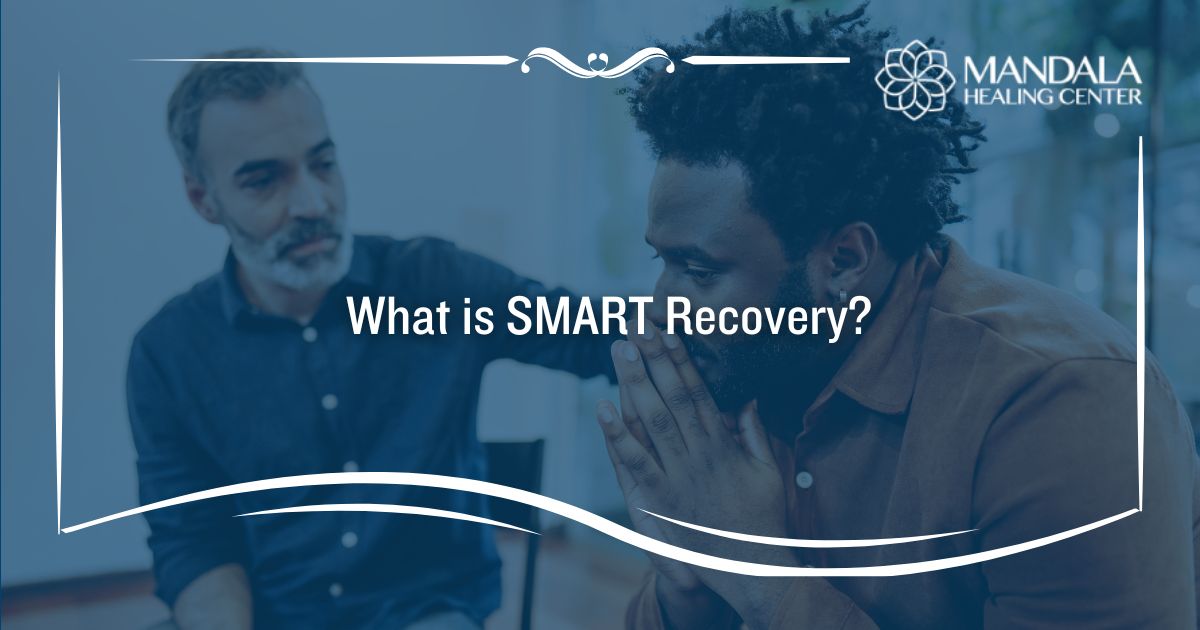Addiction is a chronic and progressive disease that affects millions of Americans each year. According to the Substance Abuse and Mental Health Services Administration (SAMHSA), 48.7 million people suffered from a substance use disorder in 2022.[1]
Addiction can get worse as time goes on, so you must attend an addiction treatment program to learn how to manage the condition. After you complete a recovery program, you have to continue working at deconstructing addictive behavior and implementing positive lifestyle changes. One of the best ways to stay sober is by attending an addiction support group.
Most people think that 12-step programs like alcoholics anonymous (AA) are their only option for recovery communities. While these programs can be incredibly helpful, they are not the end-all-be-all. There are several options when it comes to addiction support groups, including a program called SMART Recovery (SR).
SR is a 4-point program based on science. Like 12-step programs, it promotes abstinence as being the best form of recovery. However, it differs from groups like AA as it does not require you to rely on a higher power or religion to achieve recovery.
In this article, you will learn:
- What is the SMART Recovery program
- How SR meetings work
- How is SR different from 12-step programs
- Is SMART Recovery effective
What is SMART Recovery?
SMART Recovery (SR) stands for self-management and recovery training. It focuses on helping you build and maintain motivation to stay sober and relies on managing your thoughts and feelings. In other words, the foundation of this program is based on evidence-based methods for positive behavioral change.
The 4-points of SR include:
- Building, increasing, and maintaining motivation
- Refusing to give in to urges
- Self-management without relying on drugs and alcohol
- Living a balanced life
During SMART meetings, you will be asked to look at behaviors that are currently destroying your life and implement plans to change them. Additionally, you will identify the emotions and thoughts that are preventing you from maintaining sobriety. Most of the coping skills and techniques used during SR are based on cognitive behavioral therapy (CBT), which is proven effective in managing substance use disorders.[2]
How Does a SMART Recovery Meeting Work?
SMART Recovery meetings can be found both in-person and online. Online meetings might be beneficial for you if you have a busy schedule or do not have access to in-person meetings nearby. That said, there are thousands of meetings that take place every week around the country.
Meetings are led by volunteers who decide to open up a meeting in their area. Many of them have dealt with addiction themselves and gone through the recovery process, giving them first-hand knowledge of what it takes to maintain sobriety.
While 12-step meetings often involve someone sharing their story of addiction, SR tends to work a bit differently.
Instead of talking about their past, the facilitator will check in with the attendees, giving them a chance to talk about what they are currently struggling with. From there, the facilitator will talk about coping mechanisms, provide worksheets to practice skills and help members of the group find scientifically-based solutions for their problems.
These meetings are based on mutual support and managing your thoughts, feelings, and behaviors. Additionally, scientific knowledge is the main focus, making SR ideal for someone who is looking to move away from religion-based recovery.
How is SMART Recovery Different From 12-Step Programs?
12-step programs require you to rely on a higher power to solve your problems. You also have to admit to being powerless over drugs and alcohol. On the other hand, SMART Recovery believes you have the power to overcome your substance use disorder using coping skills and techniques found in behavioral therapy.
During a 12-step program, you have to find a sponsor to guide you through the 12 steps of recovery. In SR meetings, you are not required to find a sponsor and simply ask for advice or guidance when you need help with a specific coping mechanism or worksheet.
In other words, SMART Recovery is more based on self-reliance, personal empowerment, and evidence-based behavioral changes, while 12-step programs focus on spiritual guidance and peer support.
Is SMART Recovery Effective?
A study was published comparing alternative groups like SMART Recovery, Women for Sobriety, and LifeRing with traditional 12-step programs to determine if they are as effective. This study found that people using the SR approach fared as well as individuals who participated in groups like AA.[3]
Additionally, another study found that 71% of people in a case study reported a reduction in their substance abuse after one SMART recovery meeting, while 19% had no change.[4]
These studies prove that the science-based approach of SR can be effective for people recovering from alcohol and drug addiction.
That said, there are some things to consider before you choose this type of support group. SMART Recovery is not as widespread as 12-step groups, which means you might have to attend online meetings if there aren’t any in your area. Additionally, they are based on self-reliance, which means you need to be motivated in your recovery to experience success.
Get Connected to a Top-Rated Drug and Alcohol Rehab Program
If you or a loved one struggles with addiction, it’s time to consider attending professional treatment. Addiction recovery can be difficult, but drug and alcohol rehab centers can make the process easier.
Contact the Mandala Healing Center today to learn more about our drug and alcohol rehab program.
References:
- The Substance Abuse and Mental Health Services Administration (SAMHSA): HHS, SAMHSA Release 2022 National Survey on Drug Use and Health Data
- Science Direct: Cognitive Behavioral Therapy for Substance Use Disorders
- Journal of Substance Abuse and Addiction Treatment (JSAT): A longitudinal study of the comparative efficacy of Women for Sobriety, LifeRing, SMART Recovery, and 12-step groups for those with AUD
- Addiction Science and Clinical Practice: Piloting the integration of SMART Recovery into outpatient alcohol and other drug treatment programs












